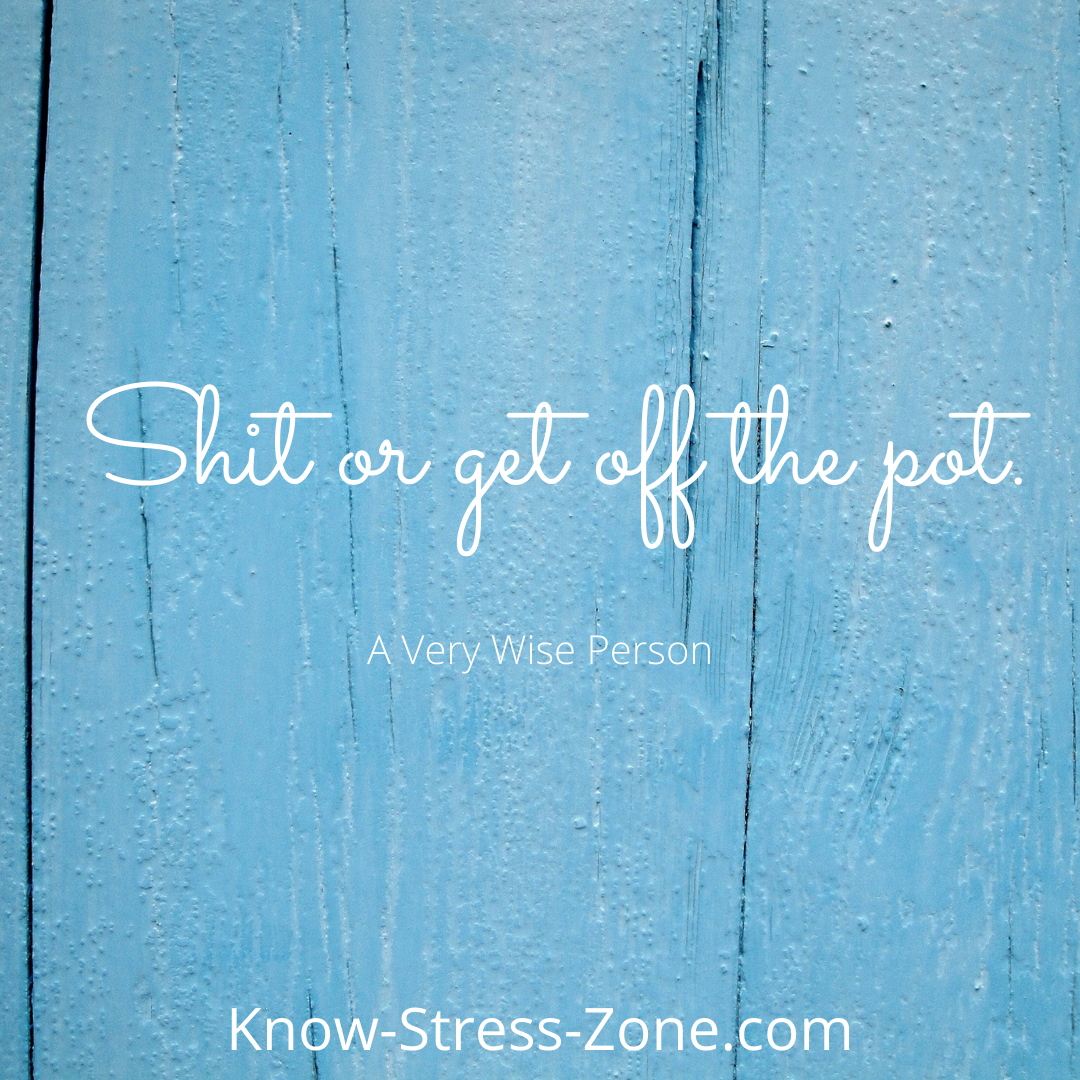How to Avoid Analysis Paralysis: 10 Tips to Get You Moving
Avoid Analysis Paralysis: Analysis paralysis is the inability to make a decision within a natural time frame due to overanalyzing a situation. It is usually a result of anxiety due to the belief that such a decision will lead to a larger problem in the not-too-distant future.
|
We are increasingly being bombarded by data thanks to the internet and social media platforms. This has cast a nasty web around our lives. We can’t see the forest for the trees. Though important to consider options and do one’s homework, it’s even more important to be able to make an actual decision to execute in a timely manner. Yes, it is possible to analyze to the point where nothing gets done. As a case in point, I have friends who must review the cocktail menu as if they were signing loan papers. I’m usually done with my first drink by the time they decide! How hard can it be??! You can see the agony in their faces and the cogs in their heads overheating. |
I believe everything in life is a function of risk. You can’t escape it. Every move, every decision comes with an associated risk. Of course, some risks are greater than others, but when I’m standing in line behind the “tasters” at an ice cream shop, I begin to lose my patience. Is life going to be so terrible because you decided on the fudge ripple instead of the dulce de leche?
Ironically, in critical situations, such paralysis can lead to the less optimal or even destructive outcomes one was trying to avoid. After all, if you are stuck trying to decide, it gives plenty of time and opportunity for other unwelcome outcomes.
I’ve lived by the motto: “Ready, Fire, Aim.” Believe it or not, this has actually worked for me. It promotes action and offers me an opportunity to adjust my actions which enable me to “fire” again more accurately.
However, you need to see where that first “artillery shell” hits so that you can alter and improve your outcome – but at least you are closer to a better outcome! This certainly beats analysis paralysis.
There are no guarantees in life. We must be willing to act on (some) analysis as well as instinct – while doing one’s best not to be rash.
- Identify it. Admit that you overanalyze.
- Why? What is your reasoning for analysis paralysis?
- Practice. Take a different exit when you are driving. Pick the day’s clothing within 20 seconds. Pick a damn ice cream flavor within 30 seconds! Notice, I gave you more time for the ice cream decision! Engaging in these smaller exercises will train your mind for the bigger decisions.
- Embrace the anxiety. It’s just anxiety. It will pass.
- Embrace uncertainty. There are no guarantees, but you can and will adjust.
- Track your progress. Use a journal and list your successes – the feelings of anxiety and uncertainty, the end results, how your victory made you feel.
This is something that you can definitely overcome. If you feel you are still having difficulty, consider the help of a therapist. They will help you dig deeper and challenge you with homework assignments. ~Ted
Avoid Analysis Paralysis: 10 Tips to Get You Moving ~parts adapted via Healthline.com
|
1. Learn to recognize it Generally speaking, it’s a good idea to think through big choices and their possible impact on your life. So how can you tell the difference between healthy decision making and analysis paralysis? Usually, our decision making process involves quickly building a list of a full range of possibilities. Then, just as quickly, we begin narrowing this list down, crossing out outliers and choices that feel obviously unsuitable. This process of elimination tends to take place in a relatively short period of time. A typical timeline might be a few days, perhaps a little longer for significant decisions. |
But with analysis paralysis, you might feel mired in possibilities. They feel ever-expanding, endless, and all equally probable.
It’s pretty understandable to feel overwhelmed when you believe you must separate one correct choice from many other options.
If you believe these options all have merit, the need to consider them equally can shut down the decision making process.
2. Explore possible causes of overthinking
It often helps to understand why you have trouble making choices.
Did a previous decision not pan out so well? If that memory still resonates, you might have trouble trusting yourself to make the right choice this time.
Maybe you worry about others judging you for making a certain choice.
You might also worry the “wrong” decision will affect your future or relationships with loved ones. (It can feel particularly tough to make a decision that affects other people.)
Most people will find a decision challenging on occasion.
But if you find yourself stuck researching and analyzing options for nearly every decision you make, increasing your awareness around why this happens can help you take steps to break the pattern.
3. Make small choices quickly
If you struggle to make any decision without a lot of consideration, start making decisions without giving yourself time to think.
This might feel terrifying at first, but the more you practice, the easier it will become.
Test your ability to make quick decisions in small ways. For example:
- Pick a restaurant for dinner without reading online reviews.
- Follow your impulse to grab the brand-name cereal without talking yourself out of it.
- Take a walk without choosing a specific route. Let your feet lead you instead.
- Choose the first show on Netflix that grabs your attention instead of spending an hour considering what to watch.
You might feel some anxiety, but allow it to flow through you. Allow yourself to play with the idea that quick, decisive actions with small consequences might have fun, even revelatory, results.
Practicing making small choices can help you get more comfortable with bigger decisions.
4. Avoid letting decision making consume you
Prolonged thinking might seem like the best way of getting to the right answer. But overthinking can actually cause harm.
Analysis paralysis can affect the nervous system and increase overall anxiety, which can contribute to symptoms like stomach issues, high blood pressure, or panic attacks.
You might have a hard time focusing on school, work, or your personal life if you devote most of your mental energy to decision making.
A more helpful approach involves setting some limits around your decision timeline. You might give yourself a week to decide, then set time aside to think each day.
Use that time to focus on your decision: Do research, list pros and cons, and so on. When your daily time (say, 30 minutes) is up, move on.
5. Work on self-confidence
Who knows you better than anyone else?
You, of course.
If some of your previous decisions have had less than positive outcomes, you might have a tendency to doubt yourself and worry that all of your decisions are bad.
Try to set this fear aside and leave the past in the past. Ask yourself instead what you learned from those decisions and how they helped you grow.
Boost your self-confidence by:
- encouraging yourself with positive self-talk
- thinking back to decisions that turned out well
- reminding yourself it’s OK to make mistakes
6. Trust your instincts
Not everyone has an easy time trusting their instincts. But those “gut feelings” can serve you well… if you let them.
Instincts typically relate less to logic and more to lived experience and emotions.
If you usually rely on research and logical reasoning to make decisions, you might feel a little doubtful about letting your feelings guide important decisions.
Factual evidence should certainly factor into some decisions, like those that relate to health and finance.
But when it comes to more personal matters, like deciding whether to keep dating someone or what city you want to settle down in, it’s also important to stop and consider how you feel.
Your specific feelings about something are unique to you, so have some faith in what your emotions can tell you about any given situation.
7. Practice acceptance
When it comes to analysis paralysis, the process of acceptance has two main parts:
First, accept your discomfort and sit with it. Your brain is pushing you to keep thinking and analyzing, but this can be exhausting.
Failing to interrupt this thought pattern will only lead to more frustration and overwhelm.
Say you can’t decide on the perfect location for your anniversary date. Remind yourself there are plenty of good locations but not necessarily one perfect spot.
Then take 1 minute (and only 1 minute!) to choose a location from the places you’ve considered, no matter how uneasy this makes you feel.
There! You’re done.
Now comes the second part: accepting your resilience. Even if the place you chose has some flaws and your date doesn’t go flawlessly, it’s OK.
You’ll recover — and maybe you’ll have a funny story to share.
8. Get comfortable with uncertainty
Many of the decisions you need to make in life will have several good options.
Making one choice prevents you from knowing how different choices might have turned out — but that’s how life works. It’s full of unknowns.
Uncertainty can be scary, but no one knows how decisions will turn out in the end. That’s why it’s so important to trust your instincts and rely on other good decision making strategies.
9. Take a break
Analysis paralysis involves ruminating, or spinning the same thoughts over and over.
This overthinking typically doesn’t lead to any new insight.
Continuing to analyze possibilities when you already feel fatigued and overwhelmed is what eventually triggers the “paralysis,” or inability to decide.
Your brain says “Keep thinking,” but instead, try the opposite.
Get some distance from your dilemma by finding an enjoyable distraction that helps relax you.
Your goal is to avoid thinking about the decision for a while, so it may help to do something that requires some mental energy.
Mindfulness exercises, like yoga and meditation, or physical activity can also help distract you.
A regular mindfulness practice can counter overthinking by helping you learn to observe distracting or distressing thoughts without criticizing yourself or becoming overwhelmed by them.
10. Try hypnotherapy
Analysis paralysis typically happens as an anxiety response.
It can trigger a cycle of worry, fear, and rumination that can be hard to disrupt on your own.
If you’re finding it tough to stop overthinking, Hypnotherapy can help you:
- identify underlying causes or triggers
- create an action plan to change this pattern
- work through any anxiety or depression symptoms making overthinking worse
It’s especially important to get professional support if the inability to make important decisions begins to affect your personal relationships, work success, or quality of life.
How to Avoid Analysis Paralysis and Avoid Burnout Right This Way Avoid Analysis Paralysis Avoid Analysis Paralysis Avoid Analysis Paralysis Avoid Analysis Paralysis Avoid Analysis Paralysis Avoid Analysis Paralysis Avoid Analysis Paralysis Avoid Analysis Paralysis Avoid Analysis Paralysis Avoid Analysis Paralysis Avoid Analysis Paralysis

